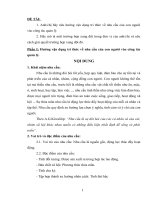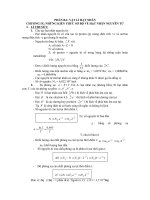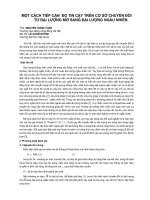Reported speech: Cách đổi từ câu trực tiếp sang câu gián tiếp
Bạn đang xem bản rút gọn của tài liệu. Xem và tải ngay bản đầy đủ của tài liệu tại đây (2.9 MB, 21 trang )
REPORTED SPEECH
O L W E N
B U I
( N G U Y E T . M O O N . 3 6 9 @ G M A I L . C O M )
CONTENTS
After the lesson, the student is expected to be able to understand:
1. What a reported speech is
2. What a reported speech is used for
3. How to change from a direct speech sentence to a reported speech sentence
REPORTED SPEECH
SAM
PETER
ALICE
DIRECT SPEECH
REPORTED SPEECH
Peter said (that)
he was busy.
Direct speech is used to
convey the exact words
what someone said.
Reported speech is used to convey the general
meaning of what someone said, making some changes
to his or her precise words.
POINT OUT DIFFERENCES BETWEEN DIRECT
AND REPORTED SPEECH - REPORTING VERBS
Valerie said, ‘I miss my sister.’
Valerie said to me, ‘I miss my sister.’
Valerie told me, ‘I miss my sister.’
Valerie said (that) she missed her sister.
Valerie said to me (that) she missed her sister.
Valerie told me (that) she missed her sister.
POINT OUT DIFFERENCES BETWEEN
DIRECT AND REPORTED SPEECH
pronoun
possessive adjective
Brian said, ‘I’m going to wear my new jacket.’
Brian said (that) he was going to wear his new jacket.’
Changes in pronouns and possessive adj
PRONOUNS – POSSESSIVE ADJECTIVES
Number
Personal Pronoun
(as Subject)
Personal Pronoun
(as Object)
Possessive
Adjective
Possessive
Pronoun
Reflexive
Pronoun
Singular
I
Me
My
Mine
Myself
You (2)
You
Your
Yours
Yourself
She
Her
Her
Hers
Herself
He
Him
His
His
Himself
It
It
Its
Its
Itself
We
Us
Our
Ours
Ourselves
You (3+)
You
Your
Yours
Yourselves
They
Them
Their
Theirs
Themselves
Plural
E V E RY – S O M E – A N Y – N O
Every
Some
Any
No
Body
Everybody
Somebody
Anybody
Nobody
One
Everyone
Someone
Anyone
No one
Thing
Everything
Something
Anything
Nothing
Where
Everywhere
Somewhere
Anywhere
Nowhere
POINT OUT DIFFERENCES BETWEEN DIRECT
AND REPORTED SPEECH - PRESENT TENSES
Alice says she hates horror films.
Alice said, ‘I hate horror films.’
Mark said, ‘I’m looking for a new job.’
Lynne said, ‘I’ve never riden a horse.’
Nigel said, ‘I’ve been waiting for hours.’
Alice said (that) she hated horror films.
Mark said (that) he was looking for a new job.
Lynne said (that) she had never ridden a horse.
Nigel said (that) he had been waiting for hours.
POINT OUT DIFFERENCES BETWEEN DIRECT
A N D R E P O R T E D S P E E C H – PA S T T E N S E S
Erica said (that) Sam had arrived (past perfect) at five.
Erica said, ‘Sam arrived (past) at five.’
Bill said (that) he hadn’t been listening.
Bill said, ‘I wasn’t listening.’
Megan said (that) she had already left.
Megan said, ‘I had already left.’
Stuart said, ‘I had been sleeping for six hours.’ Stuart said (that) he had been sleeping for six hours.
BAC K I N T I M E W H E N S H I F T I N G F RO M
DIRECT SPEECH TO REPORTED SPEECH
Past simple
Present simple
Past perfect
Present perfect
Present cont.
Past cont.
Present perfect cont.
Past perfect cont.
POINT OUT DIFFERENCES BETWEEN
DIRECT AND REPORTED SPEECH
Clarissa said, ‘I’ll be back at six.’
Nick said, ‘I’m going to have a party.’
Clarissa said (that) she would be back at six.
Nick said (that) he was going to have a party.
POINT OUT DIFFERENCES BETWEEN
DIRECT AND REPORTED SPEECH
Zoe said, ‘I can’t help you.’
Adam said, ‘I may be late.’
Zoe said (that) she couldn’t help me.
Adam said (that) he might be late.
Juliet said, ‘I must work harder.’
Juliet said (that) she had to work harder.
Charlie said, ‘You needn’t call her.’
Charlie said (that) I needn’t/didn’t need to call her.
Lydia said, ‘I want to see the film.’
Lydia said (that) she wanted to see the film.
WHEN VERB TENSES REMAIN
UNCHANGED?
• Past continuous
• Modal verbs (could, would, might, ought to, should, mustn’t)
• Must (express a logical conclusion)
• Reporting verbs in the present/future tense
• General truth/fact that continues to apply
• I wish/if only
• Second/third conditionals
TIME MARKERS
Then/at that moment
that day
that night
that year
the day before
the previous day
a month before
the week before
the previous week
Ibtisam said, “I am studying English now.”
Ibtisam said she was studying English at that moment.
Ibtisam said, “I bought a new book last week.”
Ibtisam said she had bought a new book the week before/the previous week.
the next/following day
the following year
TIME MARKERS
Lesley told me, ‘I’m meeting him tomorrow.’
Lesley told me she was meeting him the following day.
OTHER WORDS
• This → that; these → those
‘This book is very interesting,’ he said ➔ He said (that) that book was very
interesting.
• Here → there
‘I’ll be here at five,’ he said. ➔ He said he’d be there at five.
• Come → go
‘I won’t come to the party,’ he said ➔ He said he wouldn’t go to the party.
REPORTING VERBS
• Agree, demand, offer, promise, refuse, threaten + to V
REPORTING VERBS
REPORTING VERBS
REPORTING VERBS









